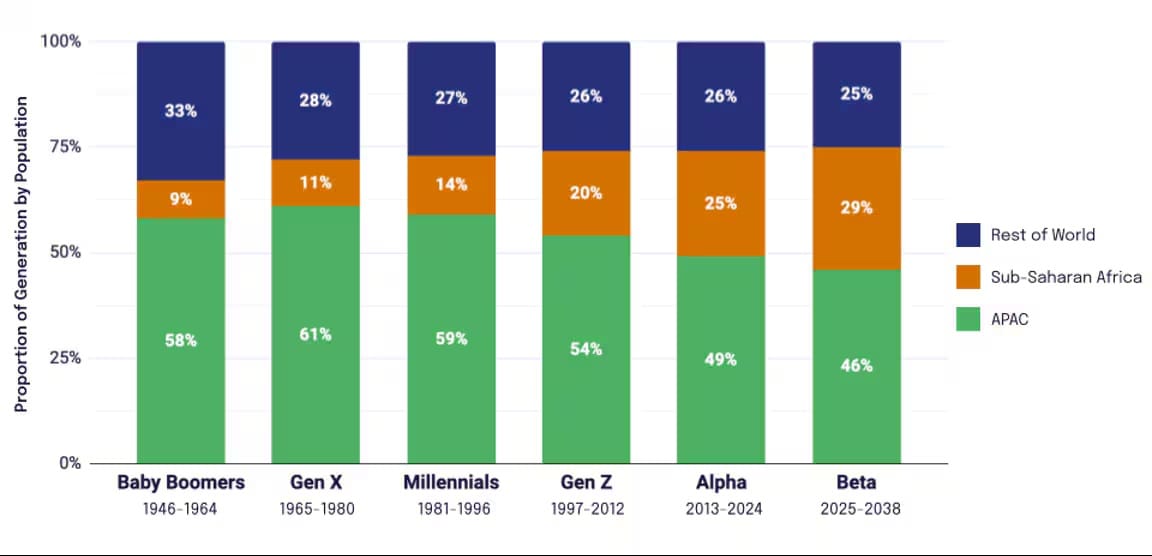
Generation Beta: The future of technology and society
The first generation to grow up in a world reshaped by AI, climate change and declining population.
Generation Beta—the generation born between 2025 and 2039, mostly the children of the younger Millennials (Gen Ys) and older Gen Zs—will grow up in a world shaped by breakthroughs in technology, rapidly evolving social norms, and an increasing focus on sustainability and global citizenship. How will they rewrite the future of society?
This year has marked the beginning of a new generation, many of whom will live to see the 22nd century. By 2035, they will make up 16% of the global population. This is the generation that follows Generation Alpha, those born between 2010 and 2024. These first generations of the 21st century will grow up in an entirely different world than the one we've known and are familiar with.
Generations defined by technology
Naming new generations with the letters of the Greek alphabet signifies how differently these generations will be raised in a world of ever more profound technological integration. Before Generation Alpha, generations were defined by key world events or cultural shifts of their time: the Greatest Generation, the Baby Boomers, the Millennials.
However, a sociological approach to generational analysis that uses set birth years standardized in 15-year time spans allows for more objective analysis and individual identity formation.
And so, the trend is set to continue with the Greek alphabet for the future generations. The first two are Generation Alpha (2010-2024) and the current Generation Beta (2025-2039), which will be followed by Generation Gamma (2040-2054), Generation Delta (2055-2069), and so on.
The Millennials witnessed the rapid spread of the Internet, the rise of the World Wide Web, and the dot-com boom. Older Millennials may remember dial-up internet and early cell phones. These technologies, for all their obvious potential, were primitive compared to what came next.
Generation Alpha saw more profound transformations than this, including the rise of smart technology and artificial intelligence. The first Alphas were born in the year Steve Jobs presented the iPhone 4 and the iPad at WWDC in 2010, and many of them grew up with iPhones and playing with iPads. They are sometimes called the iGeneration or the iPad Generation because of that.
Generation Beta will witness far more profound technological shifts than these. Generation Beta will be shaped by a tech-saturated environment where the digital and physical worlds will be seamless. They'll be the first generation to live their entire lives with AI and automation embedded in everyday existence.
The AI and robots generation
Generation Beta will be the first generation to experience autonomous transportation at scale, from self-driving vehicles to autonomous flying taxis to fully autonomous general purpose humanoid robots in their household to drone delivery. This generation will not know what life was like before these advanced technologies. Immersive virtual environments will be standard in their education, with virtual reality and augmented reality educational modules. It’s fairly likely that a humanoid robot will be their tutor.
Their education will be marked by an emphasis on personalization, with AI algorithms tailoring their learning, shopping, and social interactions. Their health will be constantly monitored by wearable health technologies. Many of them may have a brain implant for either health purposes or for neural enhancement. Even the most technologically savvy generation of parents, Gen Z, will sound old fashioned to what could be known as the AI Generation.
Future younger Betas will embrace friendships, education, and careers in a digital way because that will be the default. Building relationships and activities in offline and natural environments will be a matter of learning how to find a balance in their life.
Every generation has a crisis moment
From world wars to the threat of nuclear annihilation to pandemics and encroaching autocracy, every generation has faced its own crisis moment. Generation Beta will be no different in this regard.
Generation Beta will live in a world facing major societal challenges, especially climate change and corresponding massive shifts in the environment, flora, and fauna. Soil depletion, drought and other climate-change-induced pressures may compel population shifts on a global scale, with millions of people moving further from the tropics and closer to the poles. Marginal regions may be abandoned, resulting in rapid urbanization.
If humanity passes through this time of turbulence without suffering societal breakdown and collapse, we'll need to adopt radical changes to our political outlook and economic systems. Generation Beta is likely to be more community-focused and globally minded, scorning the consumption-at-all-costs mindset of the 20th century. They will expect and even demand sustainability, because their world will depend on it. Careful conservation of scarce resources will be necessary to preserve their way of life. They will be surrounded by high technology, but their challenges will be equally high.
Smaller but richer
According to the World Economic Forum, geography, demography, increases in income and digitalization will drive the way Generation Beta will grow, move, and spend their money (which will be digital in cashless societies). This will have an impact on the global economy.
Recent research by the World Data Lab projects that Gen Beta will be the least Asian generation ever, in relative terms. For much of the 20th century and well into the 21st, a majority of humanity's population lived in Asia. This pattern was driven by India and China, the two most populous nations on Earth.
However, declining fertility in Asia means that its share of the world population is decreasing and may eventually fall below 50%. Despite the birth rate decline, the continent's population will continue to become richer and will account for an ever greater percent of global spending. As in the 21st century, the world center of economic gravity will continue to shift toward Asia.

If you are a parent or expect to be a parent of a Generation Beta baby, leave your thoughts and expectations for this generation in the comments.
